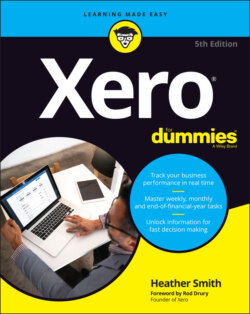Читать книгу Xero For Dummies - Heather Smith - Страница 18
FINDING, AND KEEPING, A GREAT ACCOUNTANT
ОглавлениеI hate group assignments. I’m sure it’s just a technique teachers use to minimise marking. I always seem to end up with someone utterly incompetent on my team who slows everything down, and I end up carrying this person through the assignment. I first experienced this while at university when, for one of my subjects, I was the leader of our computer programming group assignment. Our group met, decided on a plan of attack, divided up the work and arranged to meet up again so everyone could pass their work to me. I would then just have to compile it.
When the day came for everyone to submit their work, one of the team members — I’ll call her the stunned mullet, because her total lack of interest was all she contributed to group discussions — handed me her computer programming submission. It was a print-out with someone else’s name on it. I asked around and eventually found the actual author. I approached him and a great friendship formed. And now (not so many years later), he has the great honour of doing my taxes!
The benefits of having a great relationship with an accountant who knows and understands your business are many. Accountants provide advice over myriad topics and can assist with:
Developing tax-minimisation strategies
Formulating business goals
Identifying suitable key performance indicators (KPIs)
Keeping you abreast of changes to financial legislation that affect your business
Preparing budgets and cash flow forecasts
Providing specialist advice to suit your business circumstances and help you achieve your life and business goals
Once you’ve found a good one, your accountant can form an integral part of your business advisory board. Developing a consultative, positive, practical and effective working relationship with a modern tax accountant is critical for your business’s ongoing success.
So how do you find a modern, savvy, actively involved accountant? Most are in high demand and many have closed books, so ask around your business networks for recommendations and introductions. A list of Xero-certified accountants can be found on the Xero website (www.xero.com/advisors). If you have a couple of options, take a look at the accountant’s website — if you’re using Xero cloud software, you want the accountant to be technically sophisticated and a decent website is a basic requirement.
Once you think you’re ready to meet with a possible accountant for your business, here are some aspects you can find out more about:
Does the accountant have experience in the industry your business is within? Some businesses are a little complicated; for example, e-commerce, import, export, gambling and wine businesses have specific idiosyncrasies. Is the accountant aware of them, or will it be a steep learning curve that you end up paying for?
How long has the accountant been established?
How many existing clients does the accountant have using Xero?
How well does the accountant know Xero?
How will you communicate with each other and how often?
Will the accountant monitor your business and offer timely insights on a regular basis or as and when you need them? What suits your requirements?
What services does the accountant offer?
What qualifications does the accountant hold?
Do they outsource work? To what locations?
Who will be doing the work? Trainees or qualified accountants?
Can they provide a copy of the engagement letter?
Do they have any questions for you? (And they should — to ensure they are gauging whether your budget and expectations fit what they can offer.)
What are the fees?
There are no right or wrong answers here, and your choice will depend what you want out of the relationship. Above all, make sure you feel comfortable with your accountant — gut instinct is important. And once you’ve found one you can work with, keep that accountant close to your business.
